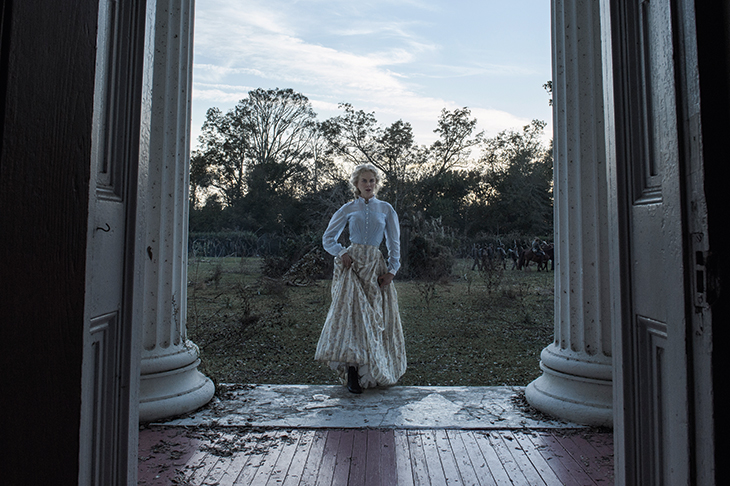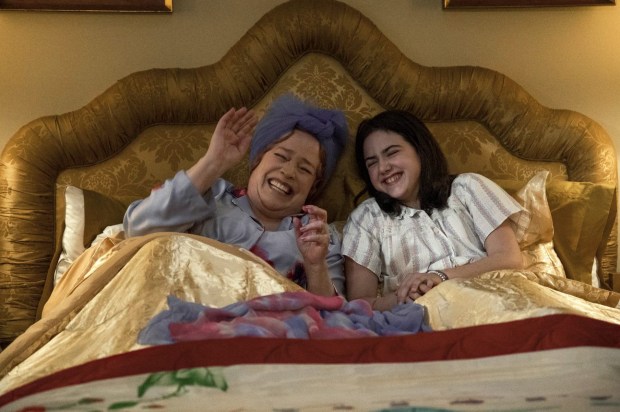Sofia Coppola’s The Beguiled is set during the American Civil War and is about a wounded Union solider, Corporal John McBurney, who seeks refuge in a girls’ school in Virginia and basically sets a sexual bomb under the place. It’s based on a 1966 novel by Thomas Cullinan, which was first filmed by Don Siegel in 1971 starring Clint Eastwood, whose McBurney forces himself on a 12-year-old girl in the opening scene. ‘Not too young for kisses,’ he says, before moving in for a long, deep snog. WTF! Thus far, I have not heard it said that Coppola’s remake does not capture the original, probably because it’s a blessed mercy. She has refashioned a pulpy, misogynistic B-movie into a wonderfully restrained but explosive feminist revenge drama, which has to be terrific. And it is.
The film begins with 12-year-old Amy (Oona Laurence) collecting mushrooms in the woods, as the mists rise and a gauzy sun filters through the vivid green of the hanging moss. (Stunning.) She has plaits and a basket. She is Little Red Riding Hood, about to encounter the wolf in the form of McBurney (Colin Farrell), who is injured and hiding out there. In this instance, there is no deep, long kiss, and neither does he sport a leonine hairdo or a big squirt of what appears to be tomato ketchup dribbling down his forehead. (I’m sorry, once you have seen the original you don’t forget it in a hurry. It’s £5 from Amazon, and also features lesbianism, incest, as well as a three-way sexual fantasy. Cheap at twice the price.)
Amy helps him back to the Miss Martha Farnsworth Seminary for Young Ladies, as run by Miss Martha (Nicole Kidman). The school, set in a grand plantation house, has dwindled to just one other teacher, Miss Edwina (Kirsten Dunst), and five students, including Elle Fanning as 18-year-old Alicia, who makes eyes at McBurney from the off. Miss Martha tends to his wounds, bathes him — it is the male character who is sexually objectified here — and decides that, even though he is plainly a deserter, it would be the Christian thing to hang on to him until he’s recovered. He is, initially, locked into their music room. At various times, they all sneak in for a gawp and a flirt. He is a charmer. The women start wearing their best frocks. Miss Edwina appears with a brooch at her throat.
This has the look of an especially beautiful period drama, but beneath all the surface politeness — ‘Would you cay-yah for a digestif?’ Martha asks McBurney — it is fraught with sexual tension, repressed longings, menace, even a sense of impending violence. Eventually, McBurney is allowed access to the rest of the house (BIG MISTAKE!) and the ensemble pieces at the dinner table are wonderful as they all vie for his attention while exchanging rivalrous passing looks. Although some are saying we’ve reached peak-Kidman lately — she seems to have starred in at least 892 films this year — you can’t deny she is the mistress of the passing look, and it’s her performance that powers this film. (Farrell seems clumsy and melodramatic by comparison.) The script, also by Coppola (who, let us not forget, wrote and directed Lost in Translation, one of our favourite films of all time), introduces humour where once there was none. There is a scene concerning apple pie that is very, very funny. There are double entendres. ‘Your whole flower garden needs tending,’ McBurney tells Martha. You may ask: all these women swooning over a single male; how is that feminist? Because, I would suggest, the core of the story involves the power shifting from him to them. Decisively. And explosively.
Coppola has pared this right back — not even a sniff of incest, just so you know — which has, it must be noted, led to some controversy. Most particularly, she has excised one character, Hallie, the black slave who is integral to the novel as well as to the earlier film. However, I don’t think we need get too hung up on this. Probably, she would have been damned if she did (another white person telling a black person’s story!) just as she’s been damned because she didn’t (a whitewash!). This is clever, tense, gripping, told at a lick — it’s less than 90 minutes — and while revenge is a dish best served cold, it’s pretty good served this way too.
Got something to add? Join the discussion and comment below.
Get 10 issues for just $10
Subscribe to The Spectator Australia today for the next 10 magazine issues, plus full online access, for just $10.
You might disagree with half of it, but you’ll enjoy reading all of it. Try your first month for free, then just $2 a week for the remainder of your first year.














Comments
Don't miss out
Join the conversation with other Spectator Australia readers. Subscribe to leave a comment.
SUBSCRIBEAlready a subscriber? Log in